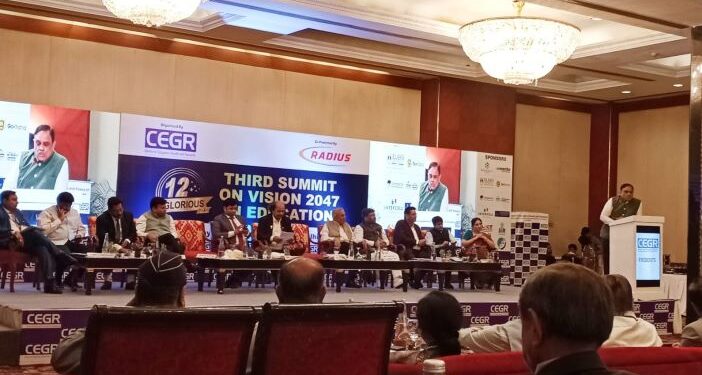Last year in October 2023, the UGC in a far-reaching reform introduced the scheme of professor of practice (PoP) for bringing practitioners, policymakers, skilled professionals etc. into higher education system and for this it also issued ‘Guidelines for Engaging Professor of Practice in Universities and Colleges.’ Under this a practitioner/professional having an experience of 15 years and more qualified for being a PoP.
Now as per AICTE chairman Prof T G Sitharam, UGC is readying an announcement to further liberalize this scheme and allow assistant professor (with a min of 5 years’ experience) and associate professor (min 8 years of experience) under the modified regulation. Speaking at the 3rd (Higher Education) Summit on Vision 2047 organized by Delhi-based think tank CEGR (Centre for Education Growth & Research) in New Delhi on May 2, Prof Sitharam said that finding an experienced professor in emerging technologies and newer domains having more years of experience than the technology or the field itself was proving an illogical barrier so UGC has taken a step to make it pragmatic to meet its objectives. He informed, no limit has been prescribed on the number of appointees on PoPs.
AICTE chairman also used the platform to reach out to technical colleges and institutions on the initiatives that AICTE has already embarked upon or being in pipeline for a roll out. He said that the council is soon launching a scheme to incentivize core engineering education in the country given the tend of not many students getting into these disciplines. “Without core engineering, the field of engineering itself is unimaginable, so it is critical for us,” he said. He also made it very clear that culture of research and innovations in institutions is need to make engineering discipline sustainable. He mentioned about 150 idea labs being set up by AICTE and about one lakh ideas received.
Speaking on Vision 2047 of making India viksit (developed), Prof Sitharam, said India has numbers (of engineering and management graduates) along with the ecosystem and quality and we are almost there though it needs some effort redesigning higher education with student-centric view where resilience, innovation and employability are part of culture. “We are into this disruptive age, where skilling, upskilling and reskilling is a continuous professor and in effect we should prepare ourselves for life-long learning,” he added.
Referring to AICTE planning to support in creating one lakh AI specialists and the high-power committee for integration of AI into curriculum, AICTE chairman joking referred to AI as All India in reference to India’s impending dominance in this domain. Calling upon institutions to come out of the old mindset of waiting for a circular to initiate things, Prof Sitharam said, “NEP says a lot of things, offers flexibility and autonomy. You are hesitant, want circulars to be issued? Create your own ecosystem for what is best for students at college level,” he added.
Elaborating on strategies for making Indian technical education an engine of future growth, he said education is the foundation on which other pillars are built. Opportunities for students, multidisciplinary approach, research, innovation and skilling at colleges is what will make our colleges productive for students. Prof Sitharam also mentioned that AICTE has made the constituent of innovation councils mandatory for every institution and already a ripple is being felt. “One needs to be there to see the festivity,” he said.
He also laid emphasis on faculty training and working on credentials of teachers. Internationalization and mobility for global networking and exposure. AICTE is setting up five facilitation centres for this.
He also mentioned how 95 colleges in the country were offering courses in regional languages and he talked about success of Hindi engineering course in a college in Noida. He said, Indian students don’t anything but they asking questions has been an area of concern. Give them option of their own language, see the pace of their holistic development including English skill. AICTE has made available translated textbooks for five streams in 13 languages and these are well-written with QR codes for video lectures and other resources.
Making education progression possible for ITI and diploma graduates is another achievement that AICTE chairman spoke about while painting a positive picture of India’s technical education. He said numbers should not intimidate us as we are not only producing engineers and managers for our country but for the world as Indian diaspora has been hailed for its work, ethics and skillsets.












